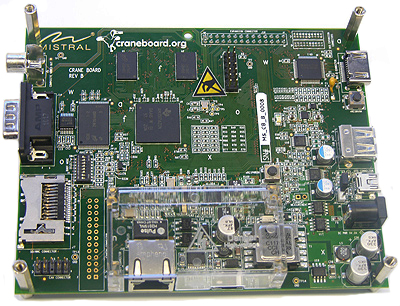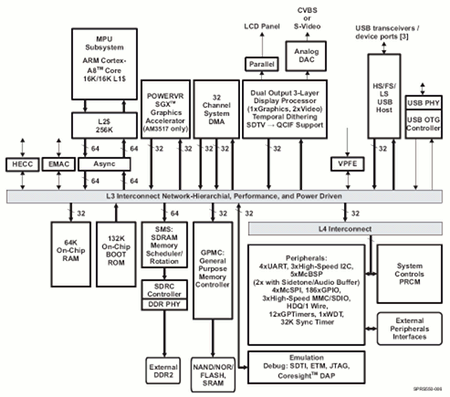CraneBoard opens up industrial Cortex-A8 SoC to developers
Dec 16, 2010 — by Eric Brown — from the LinuxDevices Archive — 32 viewsLong-time Texas Instruments (TI) hardware partner Mistral Solutions announced an open-platform development board based on TI's industrial focused, Cortex-A8-based AM35x Sitara system-on-chips (SoCs). Supported by a CraneBoard.org community site and a Linux BSP (board support package), the 5.5 x 4.5-inch CraneBoard combines the 600MHz AM3517 with features including Power over Ethernet (PoE) and CAN bus interfaces, says the company.
Over the years, Bangalore, India-based Mistral Solutions has released a number of daughtercards for TI development evaluation modules (EVMs), as well as various TI-based development kits but the CraneBoard appears to be its first full-fledged TI-based development board. It's billed as a cost-effective alternative development option to TI's own AM35x Sitara EVM.

CraneBoard
As with the BeagleBoard and the PandaBoard, the CraneBoard is distributed by Digi-Key, which is selling it for $199 and up. The CraneBoard has other BeagleBoard connections as well. CraneBoard.org is said to utilize community support and resources from BeagleBoard.org. Users can use CraneBoard.org site to "share ideas, projects, and engage in discussions with fellow developers," says Mistral.
In addition, the CraneBoard is said to be cod- compatible with the BeagleBoard, as well as other TI Cortex-A8-based devices. This would appear to include both the original OMAP3530-based BeagleBoard and the new BeagleBoard-xM, which is based on TI's faster, 1GHz DM3730 SoC.
The CraneBoard is built around the AM3517, which TI announced in October, 2009 (along with an AM3505 SoC, which is identical except for the lack of the Imagination PowerVR SGX 2D/3D graphics accelerator found on the AM3517). The AM3517's Cortex-A8 core was initially clocked to 500MHz, but is now up to 600MHz in the version used on the CraneBoard.

A block diagram of TI's AM3517
(Click to enlarge)
The AM35x chips also add 10/100 Ethernet controllers, provide PHY (physical layer) functionality for their USB 2.0 on-the-go (OTG) interfaces, and include high-end CAN controllers.
PoE and CAN interfaces target industrial apps
The CraneBoard is touted for offering features not available on existing open source, low-cost development boards, including Power over Ethernet (PoE) and Controller Area Network (CAN) bus interfaces. Both the PoE and CAN interfaces can be used in industrial applications such as human machine interface (HMI), while CAN is also suitable for automotive applications, says Mistral.
In addition to offering PoE support, the CraneBoard provides an option to power the device via the supplied USB port, as well as via a traditional power-over-DC wall adapter, says the company.
Additional I/O is said to include an RS232 port, JTAG interface, DVI-D (HDMI Connector), and TV-Out. An additional expansion port supports daughtercards and add-ons, including an LCD panel, as well as various wireless and audio modules, says Mistral. It does not appear, however, that these options are currently available.
Features and specifications listed for the CraneBoard include:
- Processor — TI AM3517 Sitara (ARM Cortex-A8) @ 600MHz with integrated 3D graphics acceleration
- Memory — 256MB DDR2 SDRAM; 256MB NAND flash
- Memory expansion — SD/MMC slot
- Networking — 10/100 Ethernet port with PoE support via TI TPS23750 PoE controller
- Other I/O:
- USB OTG with power-over-USB support
- CAN
- DVI-D (HDMI Connector)
- RS-232
- JTAG
- TV Out (CVBS)
- expansion connector (for I2C2/3, McBSP, UART, DSS, camera I/O, MMC/SD/SDIO)
- Power — DC supply 5V +/- 5%, 3A Max; 3.3V I/O
- Dimensions — 5.5 x 4.5 inches
- Operating system — Linux 2.6.32
An open source board support package (BSP) for Linux 2.6.32 is available from CraneBoard.org, based on TI's existing AM3517 Sitara EVM software. The BSP is said to include the Arago file-system, a flashing tool, board diagnostics, GNU toolchain, and peripheral drivers, says the company.
Mistral also notes that the AM3517 Sitara packaging design enables CraneBoard designers to implement low-cost, four-layer PCB designs.
Availability
The CraneBoard is available today from Mistral and a number of distributors, including DigiKey, starting at $199, says the company.
More information may be found at the CraneBoard.org site, as well as at Mistral's CraneBoard page, which links to a datasheet.
This article was originally published on LinuxDevices.com and has been donated to the open source community by QuinStreet Inc. Please visit LinuxToday.com for up-to-date news and articles about Linux and open source.